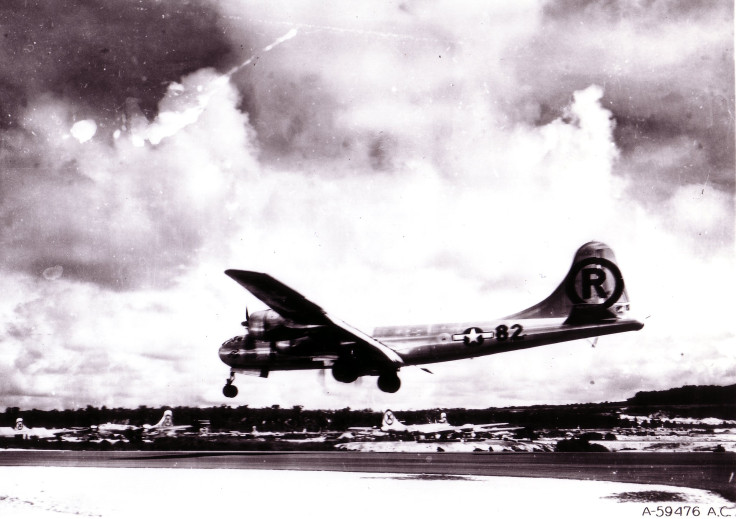Enola Gay: Last Member Of Crew That Dropped Atomic Bomb On Hiroshima Has Died

The last surviving member of the crew that dropped the atomic bomb on Hiroshima has died in Georgia nearly 70 years after the bombing, which killed 140,000 people. Tom VanKirk says his father, Theodore VanKirk, 93, died Monday in Stone Mountain. VanKirk had been the lone surviving crew member since the death of Morris Jeppson on March 30, 2010.
VanKirk, also known as "Dutch," was the navigator of the Enola Gay, a B-29 Superfortress, that dropped Little Boy -- the world's first atomic bomb -- over the Japanese city of Hiroshima Aug. 6, 1945. The bomb killed 140,000 in Hiroshima. A second atomic bomb, Fat Man, killed 80,000 in Nagasaki three days later.
In a 2005 interview with the Associated Press, VanKirk said his World War II experience showed wars and atomic bombs don't settle anything, and he'd like to see the weapons abolished. But he also said he’d do it again.
VanKirk flew on his share of noteworthy missions though none compared with the Enola Gay for historical impact or human loss. Along with pilot Paul Tibbets and bombardier Tom Ferebee (both of whom also later flew on the Enola Gay), he participated in 11 bombing missions out of England early in the war, and in October 1942 flew with Gen. Mark Clark to Gibraltar for a North Africa meeting with his French counterparts. That November the same crew flew Gen. Dwight Eisenhower to Gibraltar to take command of the North African Allied invasion. In June 1943, VanKirk took a break from the war, returning to the U.S. after having flown on 58 missions. He then resumed his service to train for the Hiroshima bombing from November 1944 to June 1945.
During the bombing run, VanKirk helped confirm the winds and target coordinates as the Enola Gay flew over Hiroshima. At a few seconds after 9:15 a.m. local time the bomb was released, changing the world forever. VanKirk was 24 years old at the time.
Asked during a 1995 interview with the New York Times if he would do it again if he could go back in time, VanKirk said that if the circumstances were the same, then yes.
“We were at war for five years,” he said. “We were fighting an enemy that had a reputation for never surrendering, never accepting defeat. It's really hard to talk about morality and war in the same sentence. In a war, there are so many questionable things done. Where was the morality in the bombing of Coventry, or the bombing of Dresden, or the Bataan death march, or the Rape of Nanking, or the bombing of Pearl Harbor? I believe that when you're in a war, a nation must have the courage to do what it must to win the war with a minimum loss of lives.”
In October 2007, according to Wikipedia, Van Kirk auctioned off the flight log he kept on board the Enola Gay for $358,500. He also published a memoir titled "My True Course."
© Copyright IBTimes 2024. All rights reserved.






















